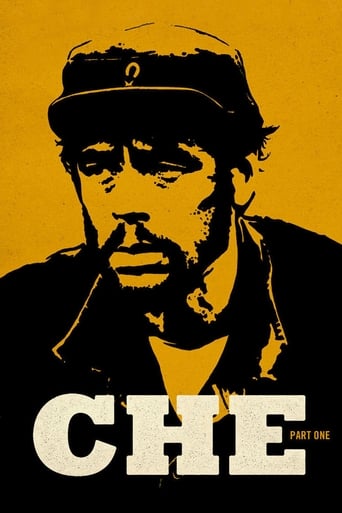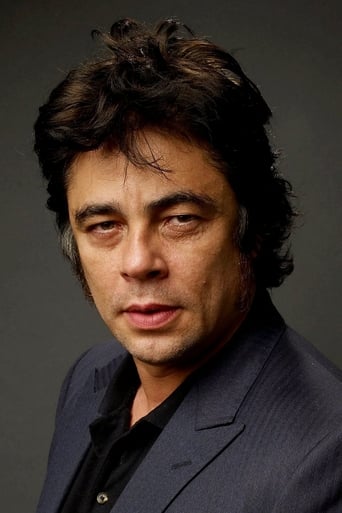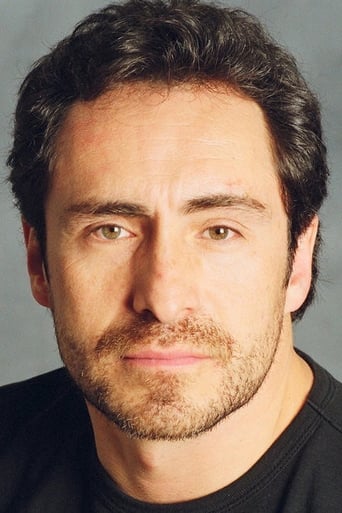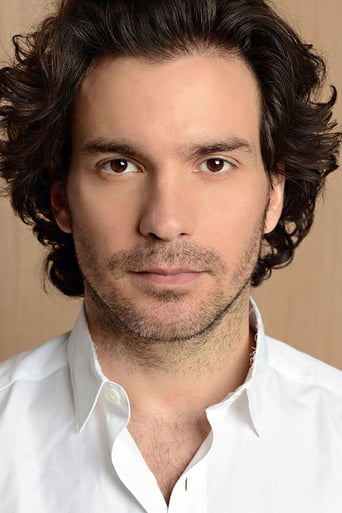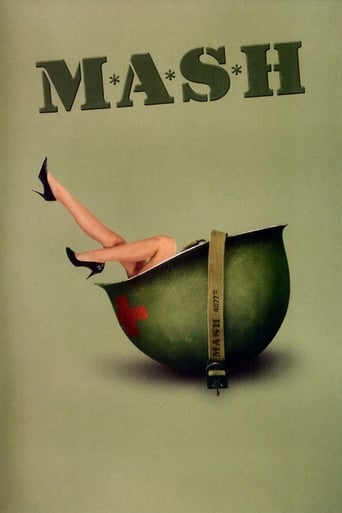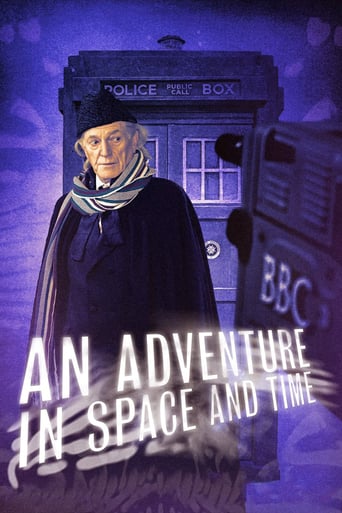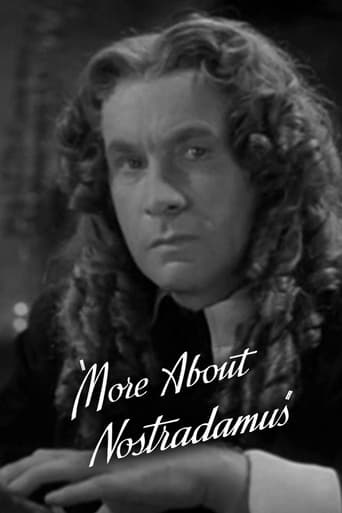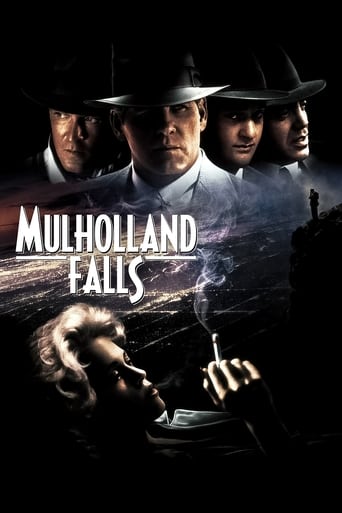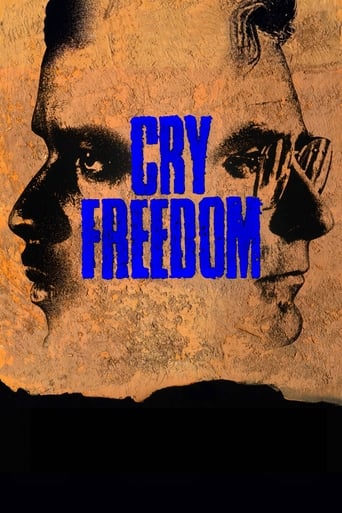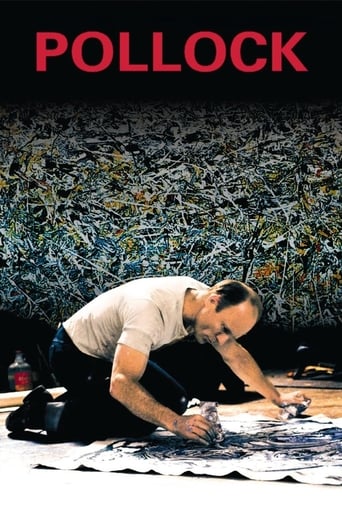Che: Part One (2008)
The Argentine, begins as Che and a band of Cuban exiles (led by Fidel Castro) reach the Cuban shore from Mexico in 1956. Within two years, they mobilized popular support and an army and toppled the U.S.-friendly regime of dictator Fulgencio Batista.
Watch Trailer
Cast


Similar titles
Reviews
To me, this movie is perfection.
Pretty Good
Don't Believe the Hype
Absolutely Fantastic
Why does Hollywood make movies about racist mass murderers and elevate them to hero status? The real Ernesto Guevara was a monster. This movie is an affront to humanity.
A terrific film that raises the spirit of a revolutionary to the hilt.This movie is a 2 part biopic that runs nearly four and a half hours. When I saw it for the first time at home on in 2009, I just took a ten-minute break after the completion of the first part and was dying to start the second part. After finishing the movie viewing, I was overwhelmed. I was very happy; there is an inspiration that I must make my life worth before I die. There is an incentive to value life.Ernesto Che Guevara is one of the most inspirational revolutionaries of the centuries the world over. The way he organized and won guerrilla wars was something that was a shock to many regimes in the American continents. The depiction of Che by Benicio Del Toro is something that took me by a surprise. Benicio Del Toro was intrepid in playing Che. Never did I feel, I was seeing an actor, all through it was just Che.The makeup was superlative. For the first ten minutes of the second part of the film, I was stunned. I could not recognize who is playing the character. So right is the disguise and so great is the acting. Cinematography and art direction in this could be used as references for generations to come. The film took me into 1950's and 1960's and made live in those times.From the word go to the last frame, there is perfection in craft technically. The spirit of revolution is in place. Cuba, Fidel Castro, Revolution, Bolivia, UN conference, Che, wow so many overwhelming elements.Kudos to Steven Soderbergh and perhaps this is his finest effort. Also to Benicio Del Toro. Benicio, you will live on as Che forever.A 5/5 for my favorite revolutionary films. One of the all-time great films this.
Any biopic on the life of Ernest "Che" Guevara is going to provoke controversy and inevitable interest in the subject matter. He was one of the most recognizable figures of the latter half of the 20th century world stage, and his legacy is ripe fruit for dissection in the film format.Unfortunately, "Che: Part One" really struggles in the content and pacing areas. Much of the film jumps back and forth between two time periods, which isn't bad in itself, but the combination of the two often feels inadequate when the main plot line of the revolution in Cuba is so lacking. As other reviewers have noted, much of the film is of the rebel army moving through the jungle and encountering Batista's forces in tense firefights and standoffs. Very little of Che is explored as an individual, but rather is understated by both Del Toro and the filmmakers, preferring to focus on his role as a leader, doctor, and guerilla. As a result, the viewer leaves with very little knowledge gained besides from what we already know about him, via his command decisions in the field, his relationship with the soldados and country people, and his speeches at the UN. This is not an intimate, inside view of Guevara, but a spectacle of the humanity of the uprising in Cuba and the bond between the guerillas.The story-telling is very straight forward, and for 2 and a half hours the viewer is treated to an almost "fly on the wall" perspective of the events, with a mostly static, mounted camera giving a majority of wide-shots. There are little close-ups and sparse editing. It is all very methodical and almost minimalistic in its approach. The film is very dry in its treatment of the historical subject matter, although saying this would also disservice the good acting chemistry between the actors, who all give very naturalistic performances. The atmosphere created through these elements and the fantastic cinematography are mostly what drives the film forward.While it definitely drags in the middle, the film makes up for it towards the end with an exciting ending detailing the Battle for Santa Clara. The optimism as the revolution finally comes to a head in the finale leaves the film ending on a high note, and I was eager to see Part 2 and the conclusion of this story.Although much material is left out, subject matter that would have shown Che having to make difficult/personal/challenging decisions as he and his compatriots seek to change their world for the better would have been welcome. As it stands, this is a faithful, but not entirely satisfying account of "The Argentine".
It helps to know that this was originally brought to life as a Terrence Malick screenplay about Che's disastrous forray in Bolivia. Financing fell through and Soderbergh stepped in to direct. He conceived a first part and shot both back to back as one film trailing Che's rise and fall.He retained however what I believe would be Malick's approach: no politics and a just visual poem about the man behind the image, exhaustive as the horrible slog through Cuban jungles and windswept Andean plateaus must have been. Malick applied this to his New World that he abandoned Che for, lyrical many times over.But Soderbergh being an ambitious filmmaker, he puzzled over this a little more. Here was a man of action at the center of many narratives about him, some fashioned by himself, conflictingly reported as iconic revolutionary or terrorist, charismatic leader or ruthless thug, erudite Marxist thinker or brutal soldier.So how to visually exemplify this contradicting ethos as our film about him? And how to arrange a world around this person in such a way as to absorb him whole, unfettered from narrative - but writing it as he goes along - off camera - but ironically on - and as part of that world where narratives are devised to explain him. As flesh and bones, opposed to a cutout from a history book.One way to do this, would be via Brecht and artifice. The Korda photograph would reveal lots, how we know people from images, how we build narratives from them. Eisenstein sought the same in a deeper way, coming up with what he termed the 'dialectical montage': a world assembled by the eye, and in such ways as the eye aspires to create it.So what Soderbergh does, is everything by halves: a dialectic between two films trailing opposite sides of struggle, glory and failure, optimism and despair. Two visual palettes, two points of view in the first film, one in the presence of cameras hoping to capture the real person, the other were that image was being forged in action.The problem, is of course that Brecht and Eisenstein made art in the hope to change the world, to awaken consciousness, Marxist art with its trappings. By now we have grown disillusioned with the idea, and Soderbergh makes no case and addresses no present struggles.But we still have the cinematic essay about all this.The first part: a narrative broadcast from real life, meant to reveal purpose, ends, revolution. The second part: we get to note in passing a life that is infinitely more expansive than any story would explain, more complex, beautiful, frustrating, and devoid of any apparent purpose other than what we choose as our struggle, truly a guerilla life.I imagine a tremendous film from these notions. Just notice the remarkable way Part 2 opens. Che arrives at Bolivia in disguise, having shed self and popular image. No longer minister, spokesman, diplomat, guerilla, he is an ordinary man lying on a hotel bed, one among many tourists. Life could be anything once more, holds endless possibility. Cessation.What does he do? He begins to fashion the same narrative as before, revolution again. Chimera this time. Transient life foils him in Bolivia. Instead of changing the world once more, he leaves behind a story of dying for it. We have a story about it as our film, adding to the rest.

